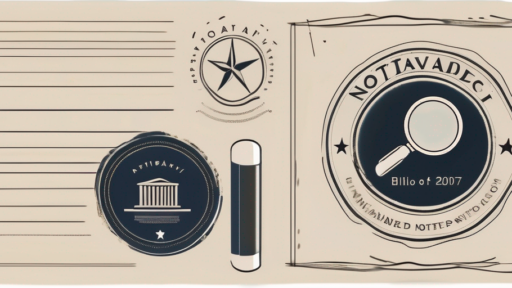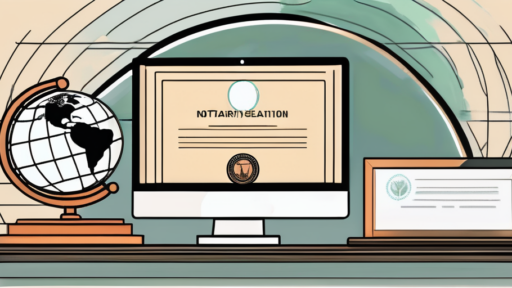The Transformation of the Notary Public Role and the Model Notary Act of 2022
Perhaps today’s most tremendous change that has happened with Notary Public is the major role of this service which took place in the last two decades. The virtually unprecedented encounter of remote communication, e-signatures and seals, and burgeoning identity theft and much more has brought about the toughest challenges. The states’ efforts to re-regulate their outdated Notary laws still fail to entirely resolve these 21st-century challenges effectively.
Recognition of a Notary Legislation Milestone
In 2023, the National Notary Association (NNA) celebrates its 50th anniversary, which will be marked by the association drafting model laws to help Notaries. Concerning the NNA’s groundbreaking celebration on March 1st, the NNA introduced the Model Notary Act of 2022. The new legal blueprint was tailored to be the basis for all states to follow up on Notary law issues.
From the NNA: Details about the Model Notary Act
The Model Notary Act
The Model Notary Act (MNA) answers the questions of state policymakers and legislators on the issue of Notary policy since it provides a detailed plan and still guarantees certain selection and disqualification rules. The need to update the MNA has been felt for many years by both U.S. states and jurisdictions, which have turned to the NNA for guidance in developing Notary law and administrative rules that pertain to a particular country, state or territory. The MNA will be changed to keep up with the times and make the necessary legal developments.
What Does the Model Notary Act Mean?
Although a small section of the people addressed by the MNA includes the lawmakers and people involved with the running of Notaries, its main goal is to assist them in skilfully steering through the legal statutes and administrative rules respectively. If approved, it will thereby have the power to change the Notaries as it will put in place the necessary permits and legal services for the Notaries’ performances.
Improving Notary Activities with the Model Notary Act
Before we get down to brass tacks of what the Model Notary Act can do for notaries, would you like to find out who we are treating?
What the Model Notary Act Does to the Notary Community
The MNA provides a solution to the lack of explicit standards for notarizing certificates, journal upkeep, and signatory verification. It further brings local Notary laws current by inserting new regulations, some of which have not been revised for many years. The Act even modernizes the fundamentals of Notary laws, like journaling, statutorily prescribed certificate wording, the practice and recognition of in-person and remote notarizations.
Many provisions, which have been introduced in the last 30 years through MNA, are as follows:
Major Notarial Acts and Their Definitions: Acknowledgments and jurats were defined among the group of major notarial acts;
Adjustments in the Keeping of Records: This part describes the procedure of recording notarial acts with great detail, which includes the specific information required to be entered in the journal for each notarization, the safe storage of the journal, and authorized individuals’ access to this information.
Certificate Wording Standardization: The certificates are prescribed in a written form that the law of a particular state authorizes the notary public to act out upon, and it has to be distinct to each act that can be notarized. This ensures that all the documents are legally consistent and clear.
Means of Identifying Signers: The set of rules defining the way to establish the identity of a signer and detect the other person in a friendly and non-invasive manner, which are the core of the liability and reliability efforts during the notarization process and are, therefore, the major part of it.
There has been comprehensive legislation on the…
Mandatory Compliance and Prohibited Practices: A crystal-clear guide for Notaries, outlining the acts they need to avoid and always follow such as not practicing law illegally which is a violation of ethics.
Regulations for Electronic and Remote Notarizations: Prescribed requirements for the execution of in-person electronic notarizations (IPEN) and online notarization, in this way, the notarial world will be able to leverage modern technological advancements without losing legal integrity.
Key Features of the Model Notary Act of 2022
With the 2022 MNA, all the model notary act provisions are merged into a singular Act that contains both traditional and technology-based notarizations. This new structure not only recognizes remote and electronic notarizations but also simplifies state Notary laws and makes them more easily understandable and consistent. The Act being clear, Notaries can be sure that they abide by the law and perform their functions effectively.
Behind the Scenes: The Drafting of the Model Notary Act
Have you ever been curious as to how something like the Model Notary Act is formed and readied for law enactment?
The NNA drafted the MNA with the help of a wide Revision Committee composed of Notaries, legal experts, technology leaders, and regulatory officials. Each section of the Act is also explained by many eminent lawyers like Michael Closen and Malcolm Morris. Included in the Act are the model rules and a history of MNA enactments found in the appendices, which provide further assistance to the public.
Adoption and Spread of the Model Notary Act
The Uniform Notary Act was published in 1973, and in the time since then, at least 40 of the United States, territories, and Native American tribes have incorporated lists of NNA model acts. Moreover, in multiple states, the MNA has been confirmed through the executive branch by way of the rule-making process and executive orders. A “adoptions map” provided on NNA’s website keeps track of the adoptions and reflects this result.
Getting the Model Notary Act of 2022
To have free access to the most vital tools of the law, you may download the Model Notary Act of 2022 as a PDF for free and simply print.
Groups That May Gain from the Model Notary Act
This act is good not just for the notaries, but also it can benefit almost all industries and professionals. The practical application of the Model Notary Act, which is without a doubt a wheel that won’t stop giving, extends from the legal sphere to the banking area and from real estate agents to small business owners. Without a doubt, everyone can benefit from the advances in notary practices that the Model Notary Act brings. Although in the legal field, let’s start our discussion. Lawyers and law firms are those that can enjoy the biggest benefits, as it is clear from the Model Notary Act of 2022 that the process has been simplified, allowing them a better focus on their legal work.
The Banking Industry
The banking sector is an example of an industry that is benefiting a lot from the Model Notary Act. The banks are doing a lot of work that needs the service of a public notary, such as loan agreements, mortgage documents, and even a warrant of attorney papers. With the act’s provisions put into effect, banks can significantly speed up the notarization process, which would, in turn, result in less paperwork and an increase in efficiency.
Real Estate
It’s obvious that the real estate agents also take a piece of the pie of the Model Notary Act benefits. In the real estate world, attestation has proven to be very important in various transactions and thus, was a necessity of many documents such as deeds, contracts, and leases. Real estate professionals, with the act’s improved notary services, can now handle these transactions without any fear, providing the clients with confidence and assurance.
Small Business Owners
Different types of business owners like Liverpool Kariuki cannot miss gaining the same profits after all. Whether it is the signing of contracts, the acquisition of permits, or the notarization of crucial business documents, the Model Notary Act is the answer. By saving notarization time and clerical effort, small business people are now at the core of the business developments and the pursuit of their ventures.
As a lawyer, a mortgage broker, a real estate agent, or any other regular Joe looking to perform a notarial document act, congratulations are in order as you will now be in the light of effectiveness and efficiency. The Model Notary Act is an advantage for people in various industries and professions, and it ensures that notarization is a very easy and fuss-free task.
Key Changes and Amendments in the Latest Model Notary Act
If you were amazed at the previous version of the Model Notary Act, just imagine the enhancements they’ve incorporated with this new edition! This time they have made more changes and this has made the provisions more suitable for today’s changing landscape without”> over the years, these have been the most relevant and effective provisions.
The act now has brand new rules for identity verification and additional consumer protections, which demonstrate the evolution of its progress. It is hard to define, but it’s like a game that changes the pieces, thereby the notaries are always the best.
Are You Prepared to Shift Your Notarizations Online?
Integrate your Business, Title Company, or Law Firm to Satisfy your Customers and Decrease Turnaround
Get a document Notarized/Sign-up
Join the Free Remote Online Notary Masterminds Facebook Group
Common Model Notary Act Question
What are the primary stumbling blocks that states are confronted with while applying the principles of the Model Notary Act of 2022?
State’s struggle to bridge the old legislation with the new standards, where technology is often the subject matter of notarization, e.g., remote notarization, which might be an accessibility issue to the notaries.
How has the Model Notary Act of 2022 encouraged them to change their everyday activities in order to remain like the other individuals?
The Act requires notaries to keep more detailed records, use standardized certificate wording, and execute stricter identification, which means that notaries are for sure faced with the growing administrative burden, but at the same time, to ensure better legal integrity, to be adapted for identity verification tools, including digital ones.
Whom does the new Model Notary Act’s compliance monitoring and enforcement belong to?
The verification as well as the implementation of the Act take place on the state level, and these operations are led by the notary public administrator. By means of audits, inspections, and reports the proper compliance of the Act is controlled, whereas penalty fines or the revocation of the notary’s commission are the available means if the person should fail to comply, thus leading to provision strict adherence.







